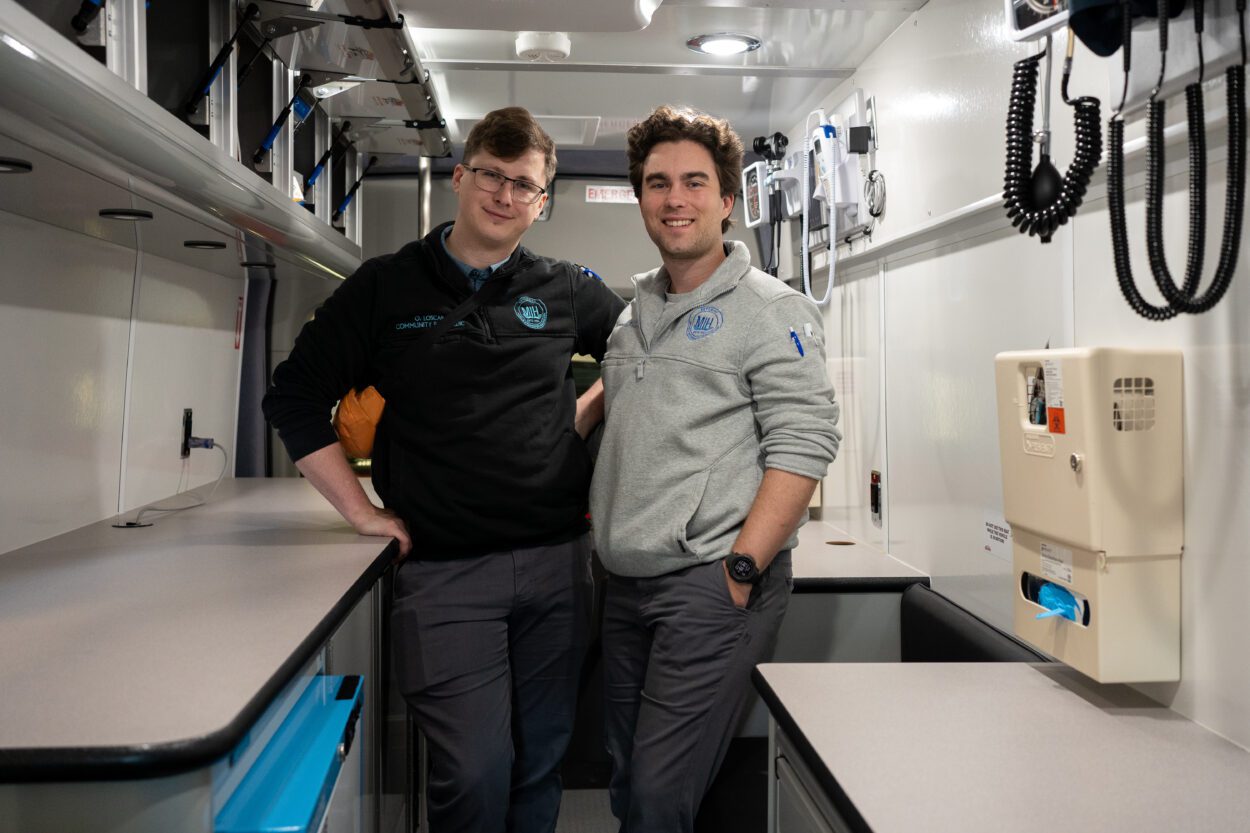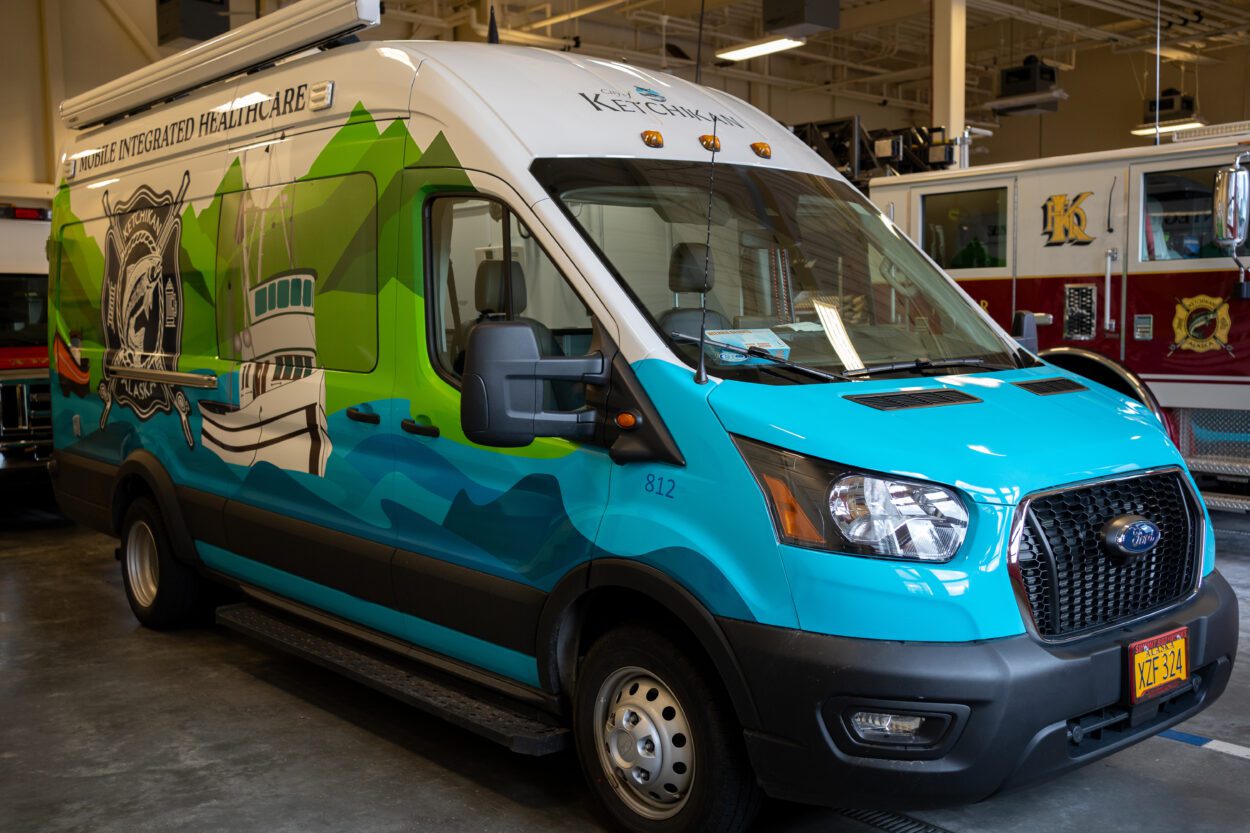
The healthcare industry funnels billions of dollars every year into new drugs and therapies to treat acute diseases. But studies from the Center for Disease Control show that American providers often fail to put the same emphasis on preventative care — targeting the risk factors of disease before they land someone in a hospital bed.
That’s the goal of a new city-run program in Ketchikan, known as the Mobile-Integrated Healthcare program.
“I think one of the biggest misconceptions that we dealt with in the first month or so is people just didn’t know what it was,” said community paramedic Owen Loscar.
“Because you hear ‘Mobile Integrated Health’ and on a flat face, you’re not sure what that means, right?” Loscar moved to Alaska from New York City and spent the last five years in the back of ambulances in the Mat-Su Borough. He moved to Ketchikan earlier this year to help get the city’s Mobile Integrated Healthcare program off the ground.
Mobile Integrated Healthcare, or MIH, is a relatively new healthcare model that is being adopted in communities across the U.S., from Des Moines, Iowa to Washington, DC to the state of Massachusetts, as a way to drive down healthcare costs and reduce strain on hospital resources.
Loscar and his partner Ben Watson go out into the community by appointment, in their brightly colored van, fully equipped with medical resources. They help patients with prevention, education, and connection to the proper resources.
“So we’re spending a lot of time with these people, wherever they’re at, really delving into what’s going on in their life,” Loscar explained. “How do their finances look? How is their health? How is their social status? So that we can connect them to who they need to in the community and resolve some of those things.”
The MIH program started in Ketchikan in early June. Loscar said their very first patient was an elderly person in town who made frequent visits to the hospital. According to Loscar, they had chronic health issues paired with a nasty infection, so he and Watson paid the patient a visit. After chatting for a while, they discovered the patient had low-grade undiagnosed dementia and had been forgetting to take pills for a chronic condition for months.
“They had such bad swelling in their legs they couldn’t walk, which was contributing to them getting an infection,” Loscar said. “So we spent the next couple of days talking to the family, getting in touch with their doctors, making sure they were actually able to take their medicine every day. And within three weeks, their entire life was changed. They were back to walking.”
Loscar said the patient hasn’t been to the emergency department since. These simple, easily overlooked issues often don’t get the time or attention they need in traditional healthcare — especially if you don’t have good insurance or a primary care physician.
“We’re trying to be more preventative, less emergencies, more proactive care for people,” said Ben Watson, the other community paramedic running the MIH. He moved here from Florida for the job. “One of the big aspects of the program was, try to reduce the amount of misuse of emergency services.”
Addressing a need
In recent years, Ketchikan has struggled to keep up with an increased volume of ambulance calls. It’s a perfect storm of an aging population, a spike in drug overdoses, more displacement and homelessness, a decline in mental health and addiction resources, and more and more tourists. All of that is placed on the shoulders of an understaffed fire department.
Watson said, like their first patient, some of the people calling ambulances don’t really need them, or their emergencies can be prevented. An ambulance ride can cost upwards of $1000. The Mobile Integrated Healthcare Unit services are free to the patient, thanks to the state grants funding the program.
For Loscar, one of the biggest barriers to care for the program right now is that they can only serve people within the city limits, due to legal issues that could pop up without memorandums with agencies outside Ketchikan.
There’s another problem though.
“The other challenge that we have is mental health care and substance abuse treatment, because right now, we really don’t have anywhere to refer those people to in town,” said Ketchikan Fire Marshal Gretchen O’Sullivan.
The Mobile Integrated Healthcare program in Ketchikan was O’Sullivan’s brainchild, along with Lisa Delaet of the Ketchikan Wellness Coalition.
The MIH program connects people with personalized resources, but they can’t do that if there’s no resource to connect them to. Ketchikan has been hemorrhaging those programs for years. Watson said it could be costing lives.
“Numerous people expressed interest in seeking treatment for substance use, but as soon as we tell them, ‘Oh, we have to send you to Anchorage,’ they lost all interest in participating in a program like that,” Watson said.
O’Sullivan said they had talked about a community paramedic program for years. She said that when they launched the program a few months ago though, some in Ketchikan, including some local officials, assumed that the MIH’s mission of serving “vulnerable populations” meant they patrolled the city and exclusively served the homeless.
According to O’Sullivan, they do offer care to the island’s homeless — the van is stocked with warm hats, socks, feminine products, and harm reduction kits and they recently managed to connect a couple unhoused people in the community with family and resources off-island. But thehe Fire Marshal said that’s a small percentage of what they do.
“We are doing what we can to assist the homeless. A warming shelter at night time would have gone a long way to assist people when it gets cold,” said O’Sullivan.
She was referencing an overnight warming shelter in the city that was recently vetoed by the Ketchikan borough mayor. The city currently doesn’t have any low-barrier (meaning: open to everyone, without requirements or restrictions) shelter services for the homeless going into winter.
Borough Mayor Rodney Dial specifically referenced the Mobile Integrated Healthcare program as a reason for his veto, saying the service will offer “increased intervention capacity” over a low-barrier overnight shelter downtown.
O’Sullivan took issue with that characterization, saying that’s not really how the program works. For one, she said, their hours are limited to 8 a.m. to 5 p.m.
“So, we will be working on things that we can do preventatively to help people before it gets cold and before it gets dark,” she said. “But there’s not a lot we can do after those hours.”
The program is, however, looking at larger ways to mitigate health disparities in the unhoused population. In their first quarter report, they noted that despite the “changes in social services” for the unhoused community since June, namely, the closing of the First City Homeless shelter and all its services, they saw a reduction in utilization by the unhoused. During that time though, they noticed a substantial increase in health and welfare disparities among the same population.
Meaning, Ketchikan’s homeless community is decreasingly taking advantage of resources, and faring worse in medical outcomes.
They also noted the link between this and recidivism, writing that “multiple patients report[ed] to them the only way to have their basic needs met is to commit misdemeanors to spend time in correctional facilities.”
Positive outcomes
Watson arrived in Ketchikan from Orlando, Florida after an early career in traditional EMS work. He said this work is different — more nourishing, in a way. Watson’s goal in Ketchikan is to target the underpinning of disease, instead of just the symptoms.
“I think one of the biggest problems I experienced in my early career in EMS was, you tend to see a lot of the same people over and over again, and you don’t ever necessarily see the end result,” Watson said. “So you don’t see the positive outcomes. You don’t see these people’s problems actually getting solved. You just take care of the immediate needs that are happening right then and there. So it’s been really fun working in this program, being able to kind of help some of those underlying problems.”
The Mobile Integrated Healthcare program just began its second quarter in operation, as they hope to find new ways to serve the community, on a patient and systemic level.
To schedule a visit from the Mobile Integrated Healthcare team, you can call (907) 228-2461 or email KFDMIH@ketchikan.gov. At this time, KFD MIH operates only within the boundaries of the City of Ketchikan and does not provide immediate emergency care. Please call 911 for any possible medical emergencies.






